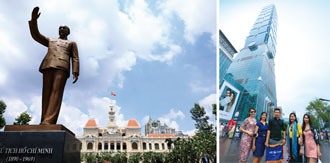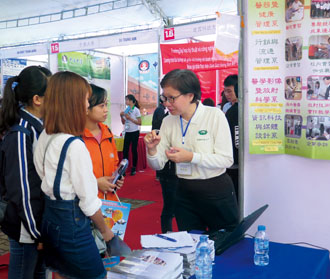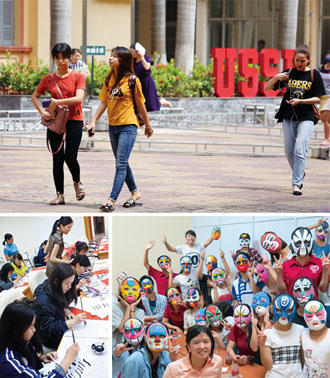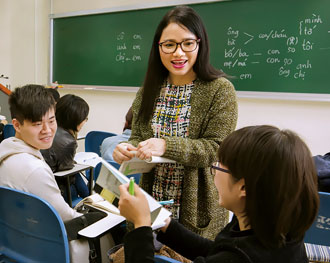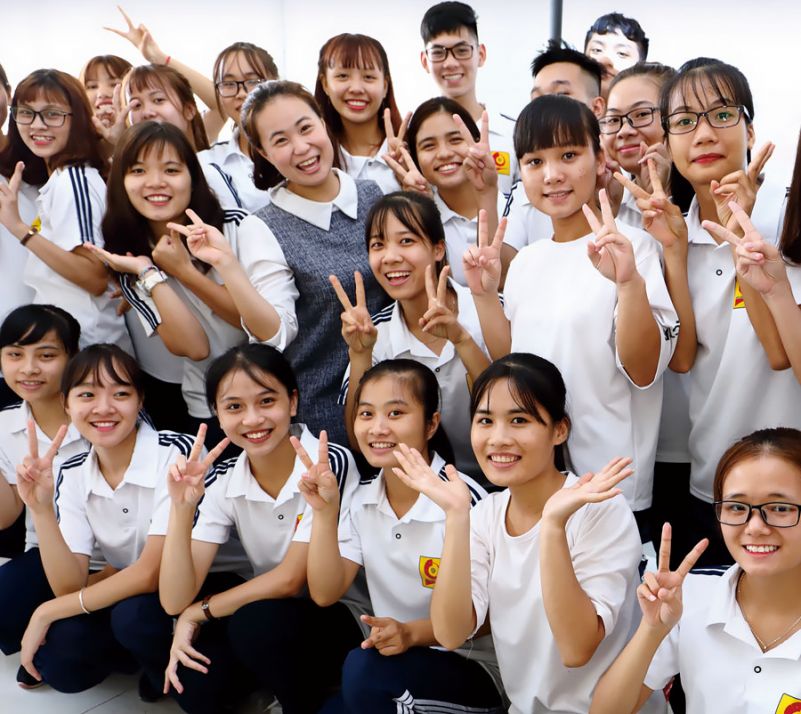
Mandarin instructor Hsu Tang-xin, center, poses with her students at Hanoi University of Industry. (Photo by Chen Mei-ling)
When Vietnamese entrepreneur Pham Xuan Hao established a travel agency in Ho Chi Minh City in 2016, he did not foresee packages to Taiwan forming a core component of his business. Yet since its launch, the firm specializing in overseas corporate meetings and incentive tours has done a roaring trade in Taiwan trips. The high demand for tours is fueled by the increasing affordability and convenience of two-way travel, Pham said, adding that the recent growth trend marks the beginning of a major expansion in tourism ties. “Taiwan is a comfortable and enjoyable destination for Vietnamese, with packages to the country now accounting for 60 percent of my company’s sales.”
People-to-people exchanges between the two sides are scaling new heights on the back of relaxed Republic of China (Taiwan) visa regulations for Vietnam passport holders and significant growth in direct flights, especially those offered by budget airlines. According to the Taipei Economic and Cultural Office in Vietnam (TECO), the number of flights per week between Taiwan and Vietnam’s major cities reached 248 in mid-2017, compared to 104 the year before.
Pham noted that as a result of factors like increasing flight availability, the cost of a four-day, three-night package to Taiwan has fallen by some 50 percent in the past three years to about US$500. Plummeting prices combined with glowing reports from visitors are burnishing Taiwan’s reputation in Vietnam as a top-notch holiday destination, he said. “My customers wax lyrical about night market delicacies, tourism factory tours, sky lantern activities and natural attractions like Taroko National Park.”
|
|
Tourism Potential
TECO Representative Richard R. C. Shih (石瑞琦) said the rise in flight services highlights intensifying interactions as well as the significant potential for continued growth in mutually beneficial exchanges. He added that boosting visitor numbers from Southeast Asia is a major focus of the government’s New Southbound Policy, a national development strategy aimed at enhancing agricultural, business, cultural, education, tourism and trade ties with the 10 Association of Southeast Asian Nations member states, six South Asian countries, Australia and New Zealand.
Measures under the policy include new visa regulations launched in June 2017 for passport holders from Vietnam and several other Southeast Asian nations. The rules enable those who have been issued an entry visa or Alien Resident Certificate by Taiwan in the past 10 years to apply online at no cost for a Travel Authorization Certificate. The certificate comprises a multiple-entry visa valid for 90 days that permits a maximum stay of 30 days.
The regulations are expected to further bolster recent growth in arrivals. Statistics from the Tourism Bureau under the Ministry of Transportation and Communications show Vietnamese visitors to Taiwan more than doubled year on year between January and July 2017 to about 218,000, while ROC nationals traveling to Vietnam rose 19 percent to around 330,000 during the same period.
Nguyen Thi Khanh, vice standing chairperson of the Ho Chi Minh City Tourism Association, said Taiwan is drawing a considerable number of repeat visitors from Vietnam, highlighting its potential as a major destination market for holidaymakers from the nation. “Taiwan’s tourism authorities and operators organize effective promotional events in our city every year, but the key factors in the country’s popularity are the wealth and diversity of attractions on offer.”
|
|
According to Nguyen, Taiwan’s leisure farms and national parks are big draws as Vietnamese vacationers typically prefer natural sites to urban environments. The nation’s reputation as a top-quality agricultural producer is also a key aspect of its allure since Vietnamese like to bring home fruit products as souvenirs and gifts, she said.
Nguyen’s association is working with counterparts in Taipei, Taichung and Kaohsiung cities in northern, central and southern Taiwan, respectively, to promote two-way tourism and foster cultural understanding. Plans are in the works to hold educational culinary events in the Taiwan cities targeting locals and Vietnamese residents of the country, who numbered almost 190,000 as of July 2017 according to the National Immigration Agency under the Ministry of the Interior. “We hope to arrange cooking classes and other activities with the tourism groups this year to boost awareness of our respective national cuisines,” she said.
Education Links
The recent expansion in people-to-people exchanges is also strengthening the education sectors of both nations. At the forefront of efforts to deepen academic ties is Wenzao Ursuline University of Languages. The Kaohsiung-based tertiary institution teamed up with the University of Social Sciences and Humanities (USSH)—part of Vietnam National University, Hanoi (VNU)—to set up the Taiwan Education Center on USSH’s campus in 2014.
Financially supported by the Ministry of Education (MOE), the center offers Mandarin courses, provides information about studying in Taiwan, helps organize the annual Taiwan Higher Education Exposition in Hanoi and stages the Test of Chinese as a Foreign Language, Taiwan’s official Mandarin certification exam. According to Nguyen Thien Nam, the center’s director, interest in learning Mandarin is rising rapidly among young Vietnamese, with more than 2,700 students having taken classes at the facility to date. “Mandarin-speaking talent is in high demand in the private sector, particularly among Taiwan companies operating in the country,” he said.
ROC national Hsu Tang-xin (許塘欣), a Mandarin instructor at Hanoi University of Industry, similarly noted that her students are highly motivated to learn the language owing to career advantages including higher starting salaries and greater opportunities for advancement. The 24-year-old, who graduated from Wenzao’s Department of Applied Chinese in 2016, secured her teaching position through a collaborative program between the MOE and 34 Vietnamese tertiary institutions. The ministry operates such Mandarin instructor placement initiatives in about a dozen countries as part of its efforts to foster awareness of Taiwan’s academic and Mandarin-learning sectors.
|
|
Lee Ming (李明), a senior adviser in TECO’s Education Division, said about 40 Taiwan instructors are currently teaching Mandarin at colleges and universities across Vietnam under the placement program. The MOE provides an allowance of NT$45,000 (US$1,500) per month to project participants, who can also receive a monthly salary of up to US$310 and other benefits like accommodations, subsidized meals and health insurance coverage from their host institutions.
Hsu said the program is an ideal avenue for advancing cultural understanding, adding that her lesson plans incorporate a variety of activities to help students learn about all aspects of Taiwan. “I’ve a great passion for teaching Mandarin, especially overseas where I can also experience different lifestyles,” she said. “The MOE’s placement program provides excellent opportunities for cultural interactions and professional development.”
Talent Cultivation
As education exchanges and talent cultivation are central facets of the New Southbound Policy, the MOE is stepping up efforts to attract international students from Vietnam and the other 17 countries covered by the initiative. Last August, the ministry began offering subsidies to Taiwan universities that craft academia-industry projects, short-term vocational courses or teacher training programs for individuals from the target nations. It is also promoting the development of Southeast Asian courses at local tertiary institutions, and providing funding to enable Taiwan students, including the children of new immigrants, to pursue cultural exchange, language and internship programs in the region.
“The education initiatives are designed to cultivate skilled talent and meet the needs of Taiwan companies operating in these markets,” Lee said. “Taiwan universities have responded enthusiastically to the schemes, with representatives of 16 institutions visiting Vietnam in a single month in 2017 to recruit students.”
Do Viet Hung, vice president of Hanoi National University of Education (HNUE), said his college has established partnerships with 10 Taiwan institutions to date on student and teacher exchanges. It is also seeking to cooperate with local universities under the two-plus-two program, which allows students to complete the first two years of a bachelor’s degree at a school in their home country and the remaining two at a foreign institution.
|
|
To date, HNUE has inked such a joint degree agreement with National University of Kaohsiung (NUK). The two institutions also collaborate on language instruction, with 15-20 students from NUK opting to study Vietnamese at the Hanoi college each year.
The HNUE vice president expressed satisfaction with the growing interest in studying Vietnamese among Taiwan youths, noting that his university is eager to help address the increasing demand for Vietnamese-language instructors in Taiwan since the introduction of the New Southbound Policy. “We can deliver teacher training programs either in Taiwan or Vietnam, as well as share guidelines for designing effective language classes,” he said.
In addition to bolstering the diversity and quality of university courses in Southeast Asian studies, Taiwan’s talent cultivation programs are also offering officials the opportunity to gain working knowledge of regional languages. Civil servants Ally Chang (張藍丰) and Tai Po-hsun (戴伯勳) are enrolled at VNU University of Languages and International Studies through a government-funded one-year language training program. “Studying in the country not only ensures you pick up Vietnamese more quickly, but also allows you to acquire firsthand knowledge of local lifestyles and customs,” Chang said.
Tai also cited cultural immersion as the primary advantage of pursuing studies in Vietnam. “I’m really focusing on boosting my proficiency in Vietnamese. Taiwan is endeavoring to deepen its relations with Vietnam across the board and I want to be a part of that effort.”









